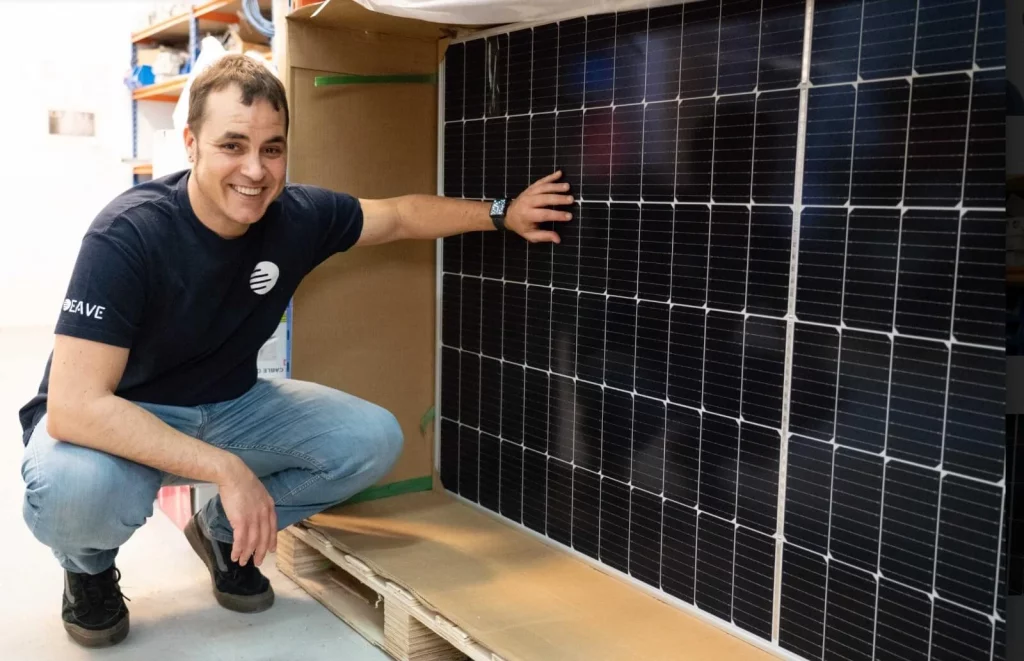
In 2019, three friends made 500 calls to residents of the Canary Islands. Whenever someone picked up the phone, they were asked two questions: if they were interested in green energy and if they used it at home. The responses were always the same: yes and no. “Everyone was interested, but nobody was using it,” recalls entrepreneur Luis Linares. The majority explained that they found green energy products expensive, complex, and unfamiliar. Some even thought that self-consumption of energy was prohibited. “We decided to create a product that would solve these problems,” highlights Linares, one of the founders of Eave, a company specialized in solar energy focusing on solar panels, batteries, and electric vehicle charging stations for self-consumption, which they install in exchange for a monthly fee over ten years. With a workforce of 82 people and constantly growing, they achieved a revenue of 4.5 million euros in 2022, and this year they anticipate surpassing ten million euros.
The idea emerged in 2018. Linares, who was then working as the commercial director of the Mercedes Benz financial division, witnessed the growing presence of electric vehicles in the market. This was the same vision shared by his friends David Machín, working in vehicle rental, and José García, who owned a bus company. “The problem was that in the Canary Islands, the majority of energy used was fossil-based. And that didn’t make much sense for these types of vehicles,” explains the entrepreneur. They explored solutions involving hydrogen and studied other clean energies until they concluded that solar energy was the ideal choice. They left their jobs and focused on their new company, founded in the summer of 2019, initially named Electric Avenue as a tribute to the song by Eddie Grant and the first public street to be illuminated with electricity. Later, they simplified the name to Eave.
The first order came quickly from a police officer who tattooed in the evenings and had a high energy consumption in his studio. “At first, it was a bit tricky, but we eventually managed to get it right. From then on, it became easier,” recalls Linares. Since then, the company has completed over 4,000 installations. Their typical model is what they call the all-in-one: installation of solar panels, batteries, and electric vehicle charging point. In fact, most of their customers come through dealerships. These dealers inform the company to conduct a study of the potential of the buyer’s residence for the vehicle, and if everything aligns, they proceed with the installation, handling paperwork for permits or applying for grants from the Next Generation EU funds. It does not require a large upfront investment because the company operates on a subscription basis: a monthly fee is paid for 120 months.
Their average customer is between 35 and 45 years old and has two main concerns. The first is energy expenditure and how it affects their finances. The second is climate change. These are individuals who make a “very thoughtful” purchase because they analyze the cost, opportunity, and when they will see a return on investment. “We always advise that the electricity consumption should be above 125 euros for you to be satisfied. Below that, you don’t save money, but there is a significant social commitment, which is also important,” emphasizes Linares. Those who buy electric cars usually transition to self-consumption, but there are also families who install them in their primary residences or entrepreneurs in their businesses despite having combustion vehicles. “Even for those who don’t believe in climate change, I say, okay, imagine it’s not true, but… Why not align with nature?” explains the businessman.
“Nowadays, there are so many European grants, and everything is so simple that it’s ridiculous not to switch to self-consumption,” argues the entrepreneur, enthusiastic about the possibilities of solar energy and the Artificial Intelligence system they have developed for energy management. It is still in the testing phase, but this technology leverages the cost of electricity—which, thanks to photovoltaics, makes it approach minimum prices at certain times—and meteorological predictions to define the most affordable charging times. “Artificial Intelligence is going to change everything,” predicts Linares. “In Spain, we will see something amazing: energy at zero cost thanks to the sun. The country can be Europe’s powerhouse,” adds the homeowner with energy self-sustainability, who believes that in the next two or three years, there will be a boom in the installation of charging points, which already exceed 21,500 nationwide, according to Aedive.
Eave, which won the Emprende XXI award from Caixabank in the Canary Islands, operates nationally, although its founders admit that expanding to the mainland was challenging. Their first branches opened in Madrid, Mallorca, and Bilbao, in addition to Gran Canaria and Tenerife. In July, they opened in Barcelona, and the next step is Andalusia, Seville. They are the distributors of Wallbox electric vehicle chargers in the Canary Islands and the official partner of Mobility Centro (a network of Mercedes-Benz dealerships), Volkswagen, and Tesla in various aspects of mobility, batteries, and charging points nationwide.